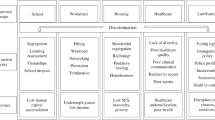Abstract
The privatization of mental healthcare among social workers has situated them under scrutiny by others in the profession who question private practice clinicians’ commitment to social justice. Some social workers accuse colleagues in private practice of a dereliction of duty, while others in the profession contend that the entrepreneurship of mental healthcare is the only way to freely realize real-world social justice change. Hence, this qualitative research study explores how clinical social workers define social justice as well as if and how they integrate it in a private practice setting. This small qualitative research study was designed to begin to illuminate strengths and gaps regarding how clinical social workers define as well as if and how they integrate social justice in a private practice setting.
Similar content being viewed by others
References
Abramovitz, M. (2005). The largely untold story of welfare reform and the human services. Social Work, 50(2), 175–186.
Abrams, L. S., & Moio, J. A. (2009). Critical race theory and the cultural competent dilemma in social work education. Journal of Social Work Education, 45(2), 245–261.
Beddoe, L. (2013). Health social work: Professional identity and knowledge. Qualitative Social Work, 12(1), 24–40.
Bloom, S. L. (1995). The germ theory of trauma: The impossibility of ethical neutrality (pp. 257–276). Secondary Traumatic Stress: Self Care Issues for Clinicians, Researchers and Educators (Sidran Press, Maryland).
Braun, V., & Clarke, V. (2006). Using thematic analysis in psychology. Qualitative Research in Psychology, 3(2), 77–101.
Caputo, R. K. (2002). Social justice, the ethics of care, and market economies. Families in Society, 83(4), 355–364.
Courtois, C. A., & Gold, S. N. (2009). The need for inclusion of trauma in the professional curriculum: A call to action. Psychological Trauma: Theory, Research Practice, & Policy, 1(1), 3.
CSWE Core Competency 5: Engage in Policy Practice. (2019). https://doi.org/10.4135/9781529704013
Furness, S. (2007). An enquiry into students' motivations to train as social workers in England. Journal of Social Work, 7(2), 239–253.
Germak, A. J., & Singh, K. K. (2009). Social entrepreneurship: Changing the way social workers do business. Administration in Social Work, 34(1), 79–95.
Goodman, L. A., Liang, B., Helms, J. E., Latta, R. E., Sparks, E., & Weintraub, S. R. (2004). Training counseling psychologists as social justice agents: Feminist and multicultural principles in action. The Counseling Psychologist, 32(6), 793–836.
Gumz, E. J. (2004). American social work, corrections and restorative justice: An appraisal. International Journal of Offender Therapy and Comparative Criminology, 48(4), 449–460.
Kiselica, M. S., & Robinson, M. (2001). Bringing advocacy counseling to life: The history, issues, and human dramas of social justice work in counseling. Journal of Counseling & Development, 79(4), 387–397.
Lord, S. A., & Iudice, J. (2012). Social workers in private practice: A descriptive study of what they do. Clinical Social Work Journal, 40(1), 85–94.
McCauley, C. R., & Moskalenko, S. (2016). Friction: How conflict radicalizes them and us. New York, NY: Oxford University Press.
McLaughlin, A. M. (2009). Clinical social workers: Advocates for social justice. Advances in Social Work, 10(1), 51–68.
Mertens, D. M., & Ginsberg, P. E. (2008). Deep in ethical waters: Transformative perspectives for qualitative social work research. Qualitative Social Work, 7(4), 484–503.
Morgaine, K. (2014). Conceptualizing social justice in social work: Are social workers “too bogged down in the trees?”. Journal of Social Justice, 4(1), 1–18.
National Association of Social Workers (NASW). (2009). Social Work Speaks: National Association of Social Workers Policy Statements, 2009–2012. Washington, DC: NASW Press.
NASW. (2017). Retrieved January 8, 2020, from https://www.socialworkers.org/about/ethics/code-of-ethics/code-of-ethics-english.
Orme, J. (2002). Social work: Gender, care and justice. British Journal of Social Work, 32(6), 799–814.
Ortiz, L., & Jani, J. (2010). Critical race theory: A transformation model for teaching diversity. Journal of Social Work Education, 46(2), 175–193. https://doi.org/10.5175/JSWE.2010.200900070.
Reisch, M. (2002). Defining social justice in a socially unjust world. Families in Society, 83(4), 343–354.
Slater, E. L. (2019). Prioritizing the dual needs of asylum-seekers while cultivating psychotherapeutic alliances. Clinical Social Work Journal. https://doi.org/10.1007/s10615-019-00707-1.
Specht & Courtney. (1995). Unfaithful angels: How social work has abandoned its mission. New York, NY: Simon and Schuster.
Stevens, M., Moriarty, J., Manthorpe, J., Hussein, S., Sharpe, E., Orme, J., et al. (2011). Helping others or a rewarding career? Investigating student motivations to train as social workers in England. Journal of Social Work, 12(1), 16–36.
Swenson, C. R. (1998). Clinical social work's contribution to a social justice perspective. Social Work, 43(6), 527–537.
Vera, E. M., & Speight, S. L. (2003). Multicultural competence, social justice, and counseling psychology: Expanding our roles. The Counseling Psychologist, 31(3), 253–272.
Wakefield, J. C. (1988a). Psychotherapy, distributive justice, and social work: Part 2: Psychotherapy and the pursuit of justice. Social Service Review, 62(3), 353–382.
Wakefield, J. C. (1988b). Psychotherapy, distributive justice, and social work: Part 1: Distributive justice as a conceptual framework for social work. Social Service Review, 62(2), 187–210.
Wakefield, J. C. (2013). DSM-5 and clinical social work: Mental disorder and psychological justice as goals of clinical intervention. Clinical Social Work Journal, 41(2), 131–138.
Acknowledgements
This is dedicated to the clients, families, and clinicians who have informed my work. I am grateful to John and to Marilyn whose unwavering encouragement and love made this possible. A special thanks to my mentor Joan Shapiro and the anonymous reviewers who contributed to the development of this journal article. Thank you.
Author information
Authors and Affiliations
Corresponding author
Ethics declarations
Conflict of interest
The author declares that the author has no conflict of interest.
Informed Consent
Informed consent was obtained from all individual participants included in the study.
Research Involving Human Participants and/or Animals
All procedures performed in studies involving human participants were in accordance with the ethical standards of the institutional and/or national research committee and with the 1964 Helsinki declaration and its later amendments or comparable ethical standards.
Additional information
Publisher's Note
Springer Nature remains neutral with regard to jurisdictional claims in published maps and institutional affiliations.
Rights and permissions
About this article
Cite this article
Slater, E.L. Private Practice Social Workers’ Commitment to Social Justice. Clin Soc Work J 48, 360–368 (2020). https://doi.org/10.1007/s10615-020-00746-z
Published:
Issue Date:
DOI: https://doi.org/10.1007/s10615-020-00746-z




